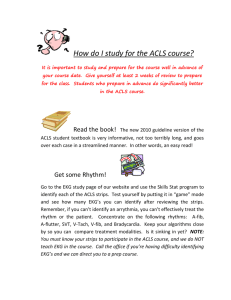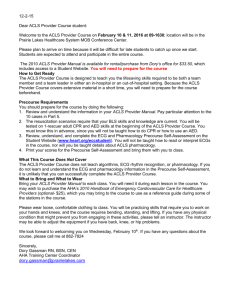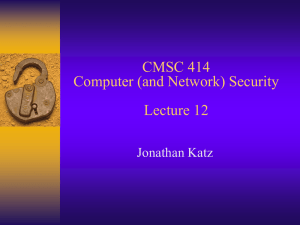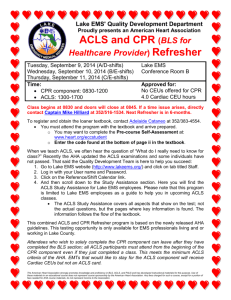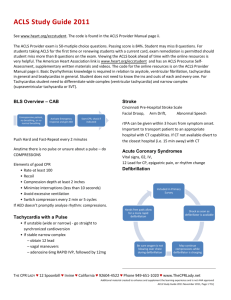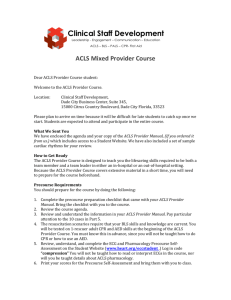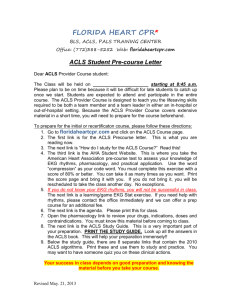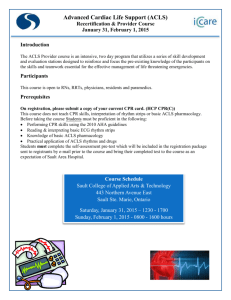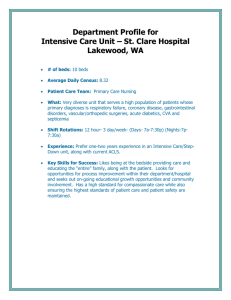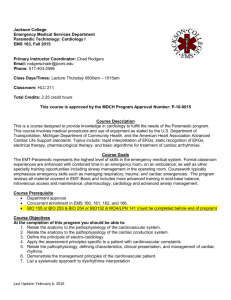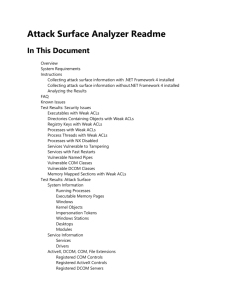Advance Cardiac Life Support (ACLS) Training: New approach
advertisement
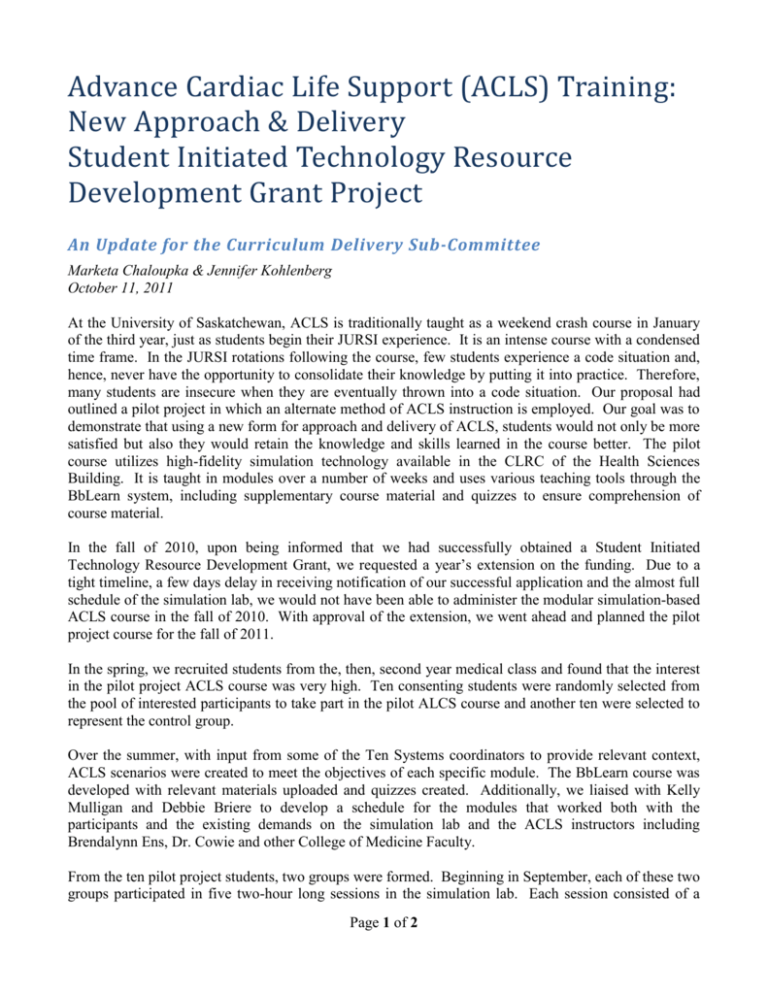
Advance Cardiac Life Support (ACLS) Training: New Approach & Delivery Student Initiated Technology Resource Development Grant Project An Update for the Curriculum Delivery Sub-Committee Marketa Chaloupka & Jennifer Kohlenberg October 11, 2011 At the University of Saskatchewan, ACLS is traditionally taught as a weekend crash course in January of the third year, just as students begin their JURSI experience. It is an intense course with a condensed time frame. In the JURSI rotations following the course, few students experience a code situation and, hence, never have the opportunity to consolidate their knowledge by putting it into practice. Therefore, many students are insecure when they are eventually thrown into a code situation. Our proposal had outlined a pilot project in which an alternate method of ACLS instruction is employed. Our goal was to demonstrate that using a new form for approach and delivery of ACLS, students would not only be more satisfied but also they would retain the knowledge and skills learned in the course better. The pilot course utilizes high-fidelity simulation technology available in the CLRC of the Health Sciences Building. It is taught in modules over a number of weeks and uses various teaching tools through the BbLearn system, including supplementary course material and quizzes to ensure comprehension of course material. In the fall of 2010, upon being informed that we had successfully obtained a Student Initiated Technology Resource Development Grant, we requested a year’s extension on the funding. Due to a tight timeline, a few days delay in receiving notification of our successful application and the almost full schedule of the simulation lab, we would not have been able to administer the modular simulation-based ACLS course in the fall of 2010. With approval of the extension, we went ahead and planned the pilot project course for the fall of 2011. In the spring, we recruited students from the, then, second year medical class and found that the interest in the pilot project ACLS course was very high. Ten consenting students were randomly selected from the pool of interested participants to take part in the pilot ALCS course and another ten were selected to represent the control group. Over the summer, with input from some of the Ten Systems coordinators to provide relevant context, ACLS scenarios were created to meet the objectives of each specific module. The BbLearn course was developed with relevant materials uploaded and quizzes created. Additionally, we liaised with Kelly Mulligan and Debbie Briere to develop a schedule for the modules that worked both with the participants and the existing demands on the simulation lab and the ACLS instructors including Brendalynn Ens, Dr. Cowie and other College of Medicine Faculty. From the ten pilot project students, two groups were formed. Beginning in September, each of these two groups participated in five two-hour long sessions in the simulation lab. Each session consisted of a Page 1 of 2 short portion of didactic learning followed by completion of at least two ACLS scenarios, each with a debriefing discussion. The last of the five sessions for both groups was completed last week. These students will complete their “final exam” this coming weekend where they will have to each run a megacode and write a multiple choice exam. Upon completion, we will administer our satisfaction survey to the pilot ACLS course participants and schedule a focus group for them with Krista Trinder to formally assess satisfaction. Casual discussion to date indicates that the students enjoyed the course and that their instructors feel that they are prepared to successfully move on to their final evaluation. The control group will complete their traditional ACLS course in January. At that time we will administer their satisfaction survey. This will also be the time at which the pilot project students will return for their ACLS knowledge and skills retention assessment approximately one month post-course. The final piece of the project, prior to processing of the data collected, is the retention assessment of the control group students, which will take place in February 2012. We will be providing the committee with a final report showing our data and recommendations for implementation of such a course at the end of April 2012. Lastly, we have submitted an abstract for the Canadian Conference in Medical Education CCME where we hope to do a poster presentation regarding or educational innovation. This conference takes place in Banff, AB in April 2012. In summary, after extending our funding a year, the pilot ACLS course, which took place in the College of Medicine simulation lab over the course of five modules, has been recently completed. The ten students are preparing for their final exam in the coming weekend; we will then evaluate their satisfaction with a survey and focus groups. Retention assessment will be completed approximately a month after both the study group and control group finish their megacode exams. Following that we plan to analyze our data. Lastly, we hope to present our work at the CCME 2012 and provide the Curriculum Delivery Sub-Committee our final report. Any questions or comments can be directed to: Marketa Chaloupka B.Sc., B.A, MBA, University of Saskatchewan MD Candidate 2012 Tel. (306) 341-2708 Email. mac051@mail.usask.ca Dr. Neil Cowie (Primary Research Supervisor) Department of Anesthesia Tel. 306-655-1187 Email. 5string.neil@gmail.com Jennifer Kohlenberg B.E Engineering, U of S; M.A.Sc. Biomedical Engineering, University of Toronto MD Candidate 2012 Tel. (306) 251-0439 Email. jdk920@mail.usask.ca Page 2 of 2
